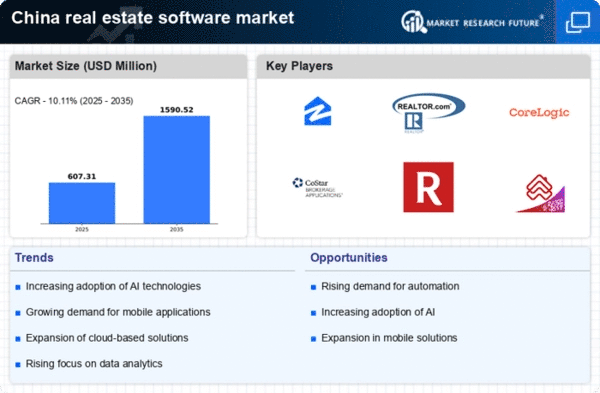Shift Towards Mobile Solutions
The shift towards mobile solutions is transforming the real estate-software market in China. With over 1 billion smartphone users, the demand for mobile applications that facilitate property searches, transactions, and management is on the rise. As of 2025, approximately 70% of real estate transactions are initiated through mobile devices, prompting software developers to prioritize mobile-friendly platforms. This trend is particularly evident among younger consumers who prefer the convenience of accessing real estate services on-the-go. Consequently, software providers are investing in mobile application development to enhance user experience and engagement. This shift not only caters to consumer preferences but also positions companies to capture a larger market share in an increasingly competitive landscape.
Government Initiatives and Regulatory Support
Government initiatives play a pivotal role in shaping the real estate-software market in China. Recent policies aimed at digitizing the real estate sector have led to increased investment in software solutions. For instance, the government has allocated approximately $500 million to support the development of smart city initiatives, which include advanced real estate management systems. This funding is expected to boost the adoption of innovative software solutions among real estate firms. Furthermore, regulatory support for data privacy and security is encouraging software developers to create compliant solutions, thereby enhancing consumer trust. As a result, the real estate-software market is likely to witness accelerated growth, driven by these supportive government measures.
Rising Demand for Property Management Solutions
The real estate-software market in China experiences a notable surge in demand for property management solutions. This trend is driven by the increasing complexity of managing diverse property portfolios, which necessitates sophisticated software tools. As of 2025, approximately 60% of property managers in urban areas utilize specialized software to streamline operations, enhance tenant communication, and optimize maintenance processes. The integration of features such as automated rent collection and maintenance tracking is becoming standard. Furthermore, the growing number of real estate transactions, estimated to reach 10 million annually, further propels the need for efficient management solutions. Consequently, software providers are focusing on developing tailored applications that cater to the unique challenges faced by property managers in China.
Growing Emphasis on Sustainability and Green Building
The growing emphasis on sustainability and green building practices is influencing the real estate-software market in China. As environmental concerns become more pronounced, developers and property managers are seeking software solutions that facilitate sustainable practices. Approximately 40% of new real estate projects in urban areas are now incorporating green building certifications, which necessitate specialized software for compliance and reporting. This trend is prompting software companies to develop tools that assist in tracking energy consumption, waste management, and overall sustainability metrics. Furthermore, the increasing consumer preference for eco-friendly properties is likely to drive demand for software that supports sustainable development, thereby shaping the future landscape of the real estate-software market.
Technological Advancements in Real Estate Transactions
Technological advancements significantly influence the real estate-software market in China, particularly in the realm of transaction facilitation. The adoption of blockchain technology is gaining traction, with an estimated 25% of real estate transactions in major cities utilizing blockchain for enhanced security and transparency. This shift not only reduces fraud but also expedites the transaction process, appealing to both buyers and sellers. Additionally, the integration of artificial intelligence (AI) in software solutions is streamlining property valuation and market analysis, providing users with real-time insights. As the market evolves, software developers are increasingly incorporating these technologies to meet the demands of a tech-savvy clientele, thereby enhancing the overall efficiency of real estate transactions.
















